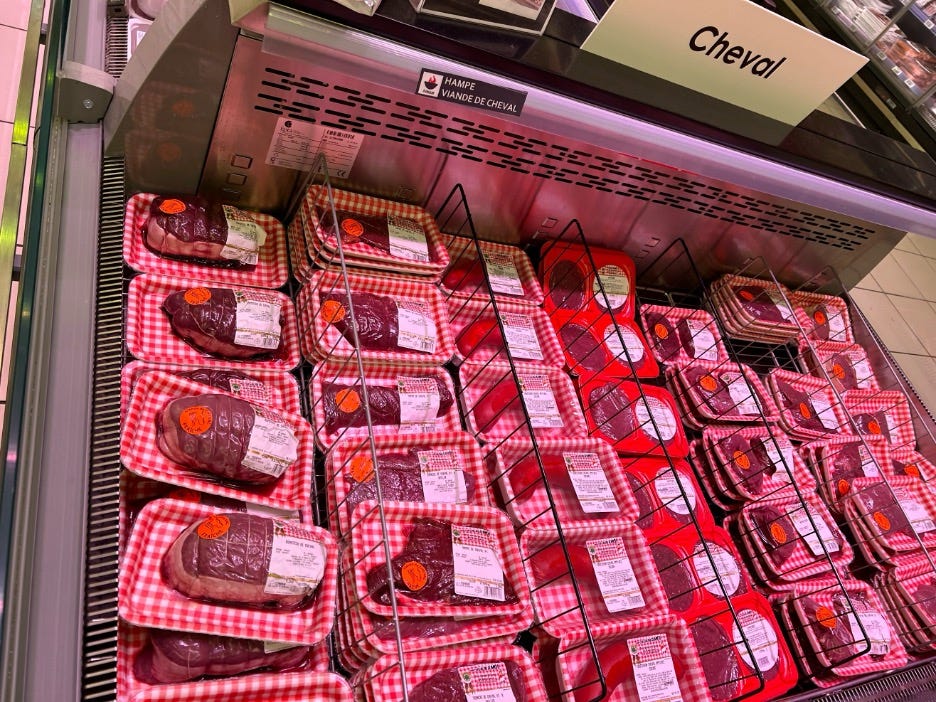Frogs Eat Horses: The Surprising Tradition of Horse Meat in France
Why Eating Horse Meat Is Still Part of French Culture
Many historical and cultural factors that have shaped and sustained France’s relationship with horse meat, known as hippophagy. The consumption of horse meat in France is deeply intertwined with moments of societal and economic necessity. From the poverty of the post-revolutionary era to military campaigns where horses became a vital food source, France’s historical context made horse meat a practical choice. The legalization of horse meat in the 19th century and the opening of boucheries chevalines further cemented its role in French culinary culture.
Today, although the tradition has waned, horse meat remains available across the country, a reminder of the adaptability and resourcefulness of French society.
The Surprising Reason Why French People Eat Horses
For the most part, Americans just don’t eat horse, or in French, cheval. Maybe it’s Black Beauty, maybe it’s Mr. Ed, maybe Seabiscuit, Trigger, cowboy movies? – something. But we don’t eat them. Horses are set apart from other livestock, celebrated for their beauty and intelligence. That’s just not the case in France: here, hippophagy (the eating of horses) is well practiced.
But there are reasons for this.
A bit of history
In the eighth century, a pope banned horse eating in Christian countries due to its association with pagan rituals among Germanic tribes. As tractors began to replace horses, they were seen as less essential. Between 1870 and 1960, hippophagy took off, essentially. It’s declined in popularity but is popular enough to be stocked in every supermarket I’ve walked into here. You’ll even find it in the smaller “express” markets.
In many countries in Europe (and the US), horse meat remains taboo and is associated with poverty or scandal. Just look at the 2013 horse meat scandal. It was once the same in France.
The French Revolution in 1789 changed a lot of things, including attitudes towards eating horse meat. Horses, once symbols of the aristocracy, became a vital food source. Later, during military campaigns like the Battle of Eylauin 1807, one of the first battles that halted Napoleon’s advance, French troops were cut off from supplies then ate their horses.
Somehow, these events helped shift public perception.
By the nineteenth century, advocates argued that horse meat was a nutritious alternative to beef or pork and horses didn’t seem to be susceptible to many of the same parasites. Horsemeat was preferred for the raw meat dish steak tartare, for example. Horsemeat banquets were held to convince Parisians of its merits, which were well attended, especially while many were starving and unable to afford other meats.
Eating Horses Becomes More Popular
Looking at France today, it is hard to remember the intense poverty of their past, but the memory lingers in tradition. Several of the newly created animal protection groups at the time also considered it more humane to eat horses rather than let them be worked to death.
Many of these early animal protection groups were begun as a way of keeping the masses under control. It was seen by many elites that if people abused animals, they would be more inclined to violence against the ruling classes. For a country with a recent memory of the Reign of Terror of the revolutionary years, it makes sense.
In 1866, France legalized the sale of horse meat, and specialized butcheries called "boucheries chevalines" opened. These shops prominently displayed horse heads to avoid confusion. The devastating siege of Paris in 1870 during the Franco-Prussian War led to severe food shortages, further normalized horse meat consumption. During the siege, people ate not only horses but rats, zoo animals, and whatever else they could lay their hands on, making horse meat a relatively positive choice.
By the early 20th century, horse meat was popular in France, praised for its low fat and high iron content. Its popularity has waned since 1970, but it’s still available all over. In 2019, only 9% of households claimed to purchase horse meat, a significant drop from previous years. It’s a relatively recent change compared to other places and may be due to the fact that horsemeat remains relatively expensive compared to pork and chicken.
Italy and Belgium still eat it as well, but percentages are lower. There is actually significant international trade. The UK exports thousands of pounds of horsemeat to Italy and Belgium each year and most of the horsemeat eaten in Europe comes from Latin America these days – with Mexico and Brazil being the greatest exporter.





